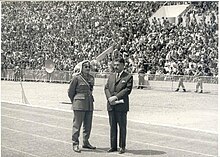Jordanian nationalism
[1] Irene Maffi identified the Jordanian national movement as a major obstacle to Hashemite Pan-Arabism, together with the strong Palestinian identity that already started forming during the colonial period.
Jordanian nationalism started developing further in the 1920s and fought for the interests of the indigenous population, opposing Hashemite policies and rejecting their rule as foreign.
Despite this, relations between the Sunni majority and ethnoreligious minorities were good, and any conflicts between them were "less a matter of religion or ethnicity than a facet of the competition between pastoralists and peasants for control of land".
[4] According to Nür Köprülü, one of the first expressions of Transjordanian identity was the 1910 Karak revolt, arguing that it should be "posited on a central place within the political history of Jordanian entity with respect to its nation building."
The revolt was sparked by excessive taxation and conscription policies implemented by Young Turks, who sought to accelerate the Ottoman control over the hitherto neglected territory.
Roger Owen also argues that Transjordan was indirectly ruled and not subject to colonization, which further allowed the widespread regionalism and tribalism to be left undisturbed.
[6] The country was established as the Emirate of Transjordan in 1921 as a British protectorate, in exchange for its wartime alliance against the Ottoman Empire during the 1916 Great Arab Revolt.
When Abdullah I formed his first royal cabinet that year, it was completely devoid of Transjordanian natives and was exclusively composed of Syrian nationalists.
As this proposal was rejected, Abdullah abandoned his Syrian ambitions and instead looked to expand his rule onto Palestine, actively influencing Palestinian politics.
[5] Annexation of the West Bank by Jordan reinforced a separate Jordanian identity as socioeconomic and political tensions emerged between them and Palestinians.
This marked the point of Hashemite dynasty abandoning its Pan-Arabic ambitions in favor of a separate Jordanian identity.

